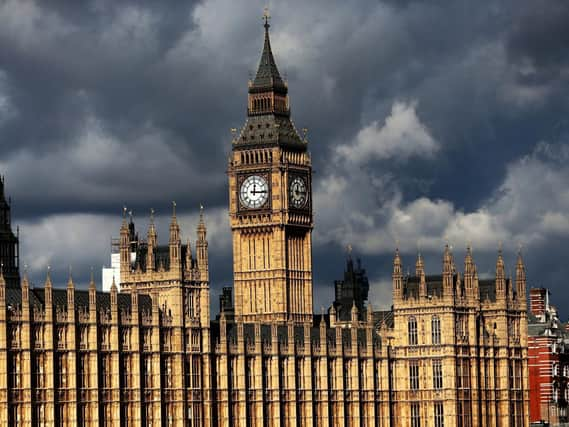Suicide risk is growing as loan charge deadline looms - Greg Wright


The Chancellor Rishi Sunak must answer this question as the latest letter carrying a grim warning about the loan charge thuds on his desk from one of the largest all party Parliamentary groups (APPGs).
Seven suicides were reported to the Loan Charge APPG in the last Parliament. Last year, I had the privilege of meeting Gayle, who was mourning the loss of her beloved father.
Advertisement
Hide AdAdvertisement
Hide AdHe was a kind, loving man who was adored by his family. But, in the final months of his life, he felt consumed by shame, despite being a model citizen who would never dream of trying to avoid paying taxes.
He died by suicide in late 2018. He was a consultant engineer in his late sixties, who had been informed that he faced the loan charge, and an unexpected bill of around £50,000.
Gayle told me her story because she wanted the world to know about the terrible impact of the loan charge.
She said: “We will never get dad back. You can’t take away what he went through but lessons can be learned.”
Advertisement
Hide AdAdvertisement
Hide AdThe Chancellor can show he is a wise and compassionate man by listening to the APPG’s sound advice.
The group believes there remains a risk of further suicides due to people being put under “unreasonable pressure" to settle by HMRC.
The APPG is imploring the Chancellor to delay the date for reporting the loan charge and concluding settlement agreements from September 30 to January 31 next year.
The letter states: “A further delay is now imperative as the pandemic has led to a situation where HMRC cannot properly conclude settlements by the specified deadline.
Advertisement
Hide AdAdvertisement
Hide Ad“The pandemic has also led to a change in financial circumstances for many, with some people losing their income or jobs and many small businesses being affected.”
The APPG has compiled evidence to support its case that HMRC cannot conclude settlements by the end of this month, “with them (HMRC) admitting there are 6,000 cases in this position”.
Every taxpayer engaged in this process has the right to have their settlement properly conducted before being hit by the loan charge.
To quote the letter: “It is clear from many cases being shared, that pre-loan charge settlements are not possible in the current time frame and people are being pressured to sign a contract with unreasonable terms and interest charges, as well as penalties which vary from case to case and have not been explained.”
Advertisement
Hide AdAdvertisement
Hide AdWithout extra time, people will be denied the opportunity to settle in a reasonable timescale or potentially at all. A further delay would relieve pressure on HMRC staff by allowing another four months for settlements to be concluded.
The letter added: “The delay is vital due to the effect of the Covid-19 pandemic on business and the economy.
“As HMRC knows, if the loan charge is imposed, as well as forcing individuals into bankruptcy, it will also close businesses, where company directors are facing the loan charge. This in turn will cause job losses."
One man, who says he is facing a HMRC demand for more than £141,000, told me “I agree with the loan charge in principle as tax laws need to be made more clear and concise, however the retrospective aspect of the loan charge sets a dangerous precedent which allows HMRC and the Treasury to look at other ways to retrospectively tax people.”
Advertisement
Hide AdAdvertisement
Hide Ad“I have requested an urgent meeting with my MP to..make a formal complaint against the HMRC who have been unprofessional throughout the settlement negotiation and have had a complete lack of regard for my health and mental health.”
HMRC said it has listened to concerns about the affordability of the loan charge and will work with all individuals to find a “manageable and sustainable solution to paying their disguised remuneration debts”.
In a statement, the Government said: "“HMRC extended the 2018/19 deadline for Loan Charge customers to 30 September 2020.
“HMRC expect the majority of individuals liable to the loan charge to be able to file a complete and accurate return by this date.
Advertisement
Hide AdAdvertisement
Hide Ad“The Government has no plans to extend the deadline beyond 30 September 2020.
“HMRC will take a proportionate and reasonable approach to anyone who is unable to file their tax returns and pay the tax due or agree a time to pay arrangement by the 30 September 2020 deadline as a direct result of COVID-19."
Almost every day, emails arrive in my inbox from people who say they are being pushed beyond despair by the loan charge.
Time is running out. Desperate people are crying out for decisive action from Mr Sunak.
Support The Yorkshire Post and become a subscriber today.
Advertisement
Hide AdAdvertisement
Hide AdYour subscription will help us to continue to bring quality news to the people of Yorkshire. In return, you'll see fewer ads on site, get free access to our app and receive exclusive members-only offers.
So, please - if you can - pay for our work. Just £5 per month is the starting point. If you think that which we are trying to achieve is worth more, you can pay us what you think we are worth. By doing so, you will be investing in something that is becoming increasingly rare. Independent journalism that cares less about right and left and more about right and wrong. Journalism you can trust.
Thank you
James Mitchinson
Comment Guidelines
National World encourages reader discussion on our stories. User feedback, insights and back-and-forth exchanges add a rich layer of context to reporting. Please review our Community Guidelines before commenting.